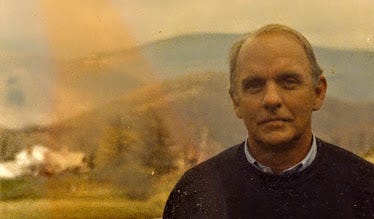Buechner Sought Universal Truths and Developed a Comprehensive View of Life
Different from his mentor C.S. Lewis, he acknowledged that spiritual matters are experiential, not necessarily logical
This is the first part of a magazine piece I wrote in 1988. I dug it up after learning of Mr. Buechner’s death at the age of 96, and have updated it somewhat.
RUPERT, VT — When Frederick Buechner returned to his home here last winter after a holiday in Florida, he found about 16 messages on his answering machine. One of them was from a young male, who left a simple statement: “You don’t know who I am, but I am a fan of yours. I just wanted to tell you that I have twice in the last six weeks contemplated suicide, but it was because of your books that I didn’t do it.”
For Buechner, whose own father killed himself, “hearing that message meant more to me than winning the Nobel Prize.”
Author Frederick Buechner, known for his books finding the sacred within the ordinary events of life, at his home in Rupert Mountain, Vermont, 1988. Photo by Jim Buie.
CNN’s John Blake wrote on August 21 that Buechner’s books may provide a bridge between red and blue-state cultures, a model "at a time when some leaders have transformed faith into a political battering ram." He “made room for the terrible and the beautiful.' How Fred Buechner redefined the art of not preaching.”
Keep reading with a 7-day free trial
Subscribe to Slender Threads / Global Citizens / Public History to keep reading this post and get 7 days of free access to the full post archives.





